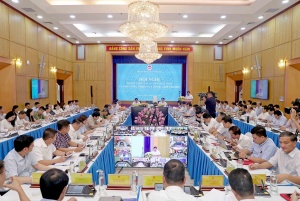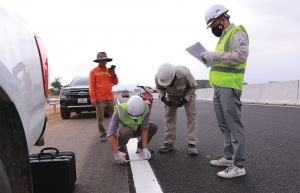The need for public investment to maximise FTA gains
 |
| Raymond Mallon - Economist |
Foreign investment and associated transfers of technology, know-how, and market access has helped Vietnam become a major exporter of electronics, garments, footwear, furniture, seafood, and agriculture commodities. Many multinational corporations have established production bases in Vietnam to take advantage of its skilled and relatively low-cost workforce, and strategic location within Asia. This has exposed Vietnamese entrepreneurs, managers, and workers to international best practices, promoting skills development and innovation.
Growing links with global supply chains have further helped Vietnam to develop its technical capabilities. Moving up the value chain has generated increased employment in more sophisticated and higher value-added manufacturing and services. This has been a key driver of productivity and income growth.
Successful strategies to expand trade and foreign investment, to link with global value chains to upgrade industries, and to boost skills development, have positioned Vietnam as an increasingly dynamic player in the global economy.
Integration has also presented challenges. The economy has become more vulnerable to economic shocks, and some businesses have failed in the face of increasing competition.
Most of the initial focus of funding from overseas was on low productivity and labour-intensive industries, often with low wages and variable working conditions and job security. The shift to higher value-added production with increased linkages to the rest of the economy is taking time. Some investment and trade activities impose environmental costs. The challenge now is to encourage investment into cleaner, higher productivity and more sustainable business.
Free trade agreements, or more accurately regional economic cooperation agreements, are opening new opportunities for Vietnamese businesses, workers, and consumers. But increased and more effective public investments are needed to maximise national economic gains. In this context, the World Bank’s recent finding that “Vietnam’s public investments have been on a declining trend from 8 per cent of GDP in 2011 to 6 per cent in 2022” is a real concern.
Public investment is needed to develop modern and efficient infrastructure, including multi-modal transport networks, port facilities, energy supply and distribution, urban centres and industrial zones, and digital connectivity. Unfortunately, the World Bank reports that the quality of Vietnam’s infrastructure ranked 77 out of 141 countries, well behind regional competitors. Improvements in infrastructure, combined with a supportive policy environment, can enhance competitiveness by attracting business investment, reducing trade and production costs, and facilitating the movement of goods and services.
Public investments and policy reforms in trade facilitation, customs modernisation, and regulatory reforms to streamline cross-border trade procedures are needed to make it easier for businesses to engage in international trade. Such measures can be particularly important for small- and medium-sized enterprises to begin building international economic links.
Public investments that catalyse increased private investments in logistics and supply chain infrastructure can help reduce transportation costs, decrease delivery times, and enhance the competitiveness of Vietnamese products. Investments in supporting industries can help businesses to diversify their exports and reduce dependency on helping to mitigate potential impacts of external shocks.
Successful integration into higher value regional production networks will also require increased public investments in education, vocational training, and skills development to enhance labour productivity. Quality education and life-long learning can spur innovation and help Vietnam adapt to emerging market opportunities. Collaborative public investment in research and development and technology clusters can help promote the technological advancement and innovation needed to integrate with more advanced regional value chains.
A policy focus on smaller enterprises can also help maximise the employment gains from integration and help ensure more equitable outcomes from integration. Public investments in infrastructure and institutional development can be especially important for them. Despite the challenging international environment, and domestic constraints, Vietnam continues to achieve relatively high trade and investment flows that benefit most citizens. However, more can be done to improve the national outcomes from economic integration.
Increased and better managed public investment can enhance Vietnam’s competitiveness, further expand trade opportunities, and foster innovation. This would help Vietnam to benefit more from participation in the new generation economic cooperation agreements that are replacing more narrowly focussed trade deals.
Increased and more efficient and collaborative investments in human development, green technologies, living environments, and social safety nets can help ensure that the benefits of economic growth are shared by all segments of society while better protecting the environment.
Encouragingly, the General Statistics Office reports a sharp recovery in public investment disbursements during the first half of 2023. But more can be done.
The level and efficiency of public investment disbursements can be strengthened by improving public investment planning, coordination with the provinces, and the design and management of related projects. Decision makers and implementing agencies need to be more accountable for delivering quality investments in line with agreed targets.
 | MPI urges the need for swift project implementation The Ministry of Planning and Investment (MPI) organised a conference on July 21 to review its performance in the first half of the year and to implement tasks for the second half. |
 | Disbursement playing part in growth goals Due to solid disbursement in the first seven months of the year, public investment projects are expected to be the driving force of the economy in the remainder of the year as part of efforts to reach annual growth targets. |
What the stars mean:
★ Poor ★ ★ Promising ★★★ Good ★★★★ Very good ★★★★★ Exceptional
 Tag:
Tag:
Related Contents
Latest News
More News
- IP alterations shape asset strategies for local investors (January 22, 2026 | 10:00)
- 14th National Party Congress: Vietnam - positive factor for peace, sustainable development (January 22, 2026 | 09:46)
- Japanese legislator confident in CPV's role in advancing Vietnam’s growth (January 22, 2026 | 09:30)
- 14th National Party Congress: France-based scholar singles out institutional reform as key breakthrough (January 21, 2026 | 09:59)
- 14th National Party Congress: Promoting OV's role in driving sustainable development (January 20, 2026 | 09:31)
- 14th National Party Congress affirms Party’s leadership role, Vietnam’s right to self-determined development (January 20, 2026 | 09:27)
- Direction ahead for low-carbon development finance in Vietnam (January 14, 2026 | 09:58)
- Vietnam opens arms wide to talent with high-tech nous (December 23, 2025 | 09:00)
- Why global standards matter in digital world (December 18, 2025 | 15:42)
- Opportunities reshaped by disciplined capital aspects (December 08, 2025 | 10:05)




















 Mobile Version
Mobile Version